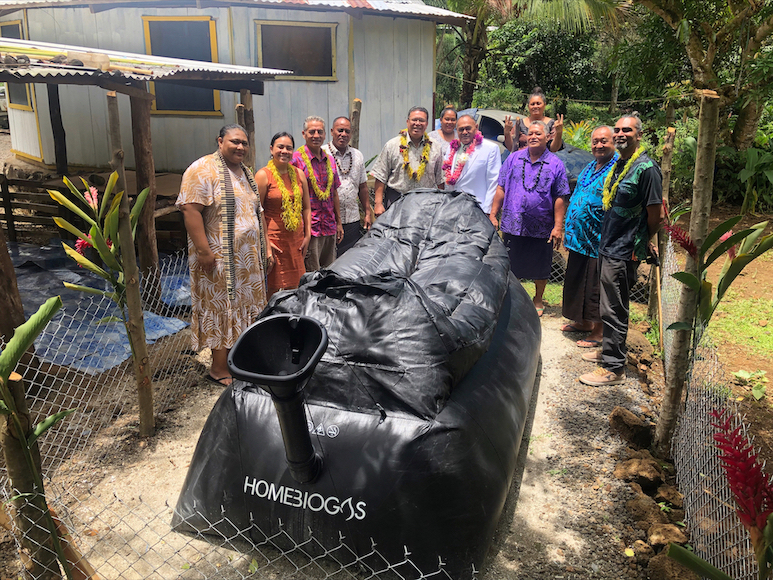Apia, Samoa – The Tapatapaō community celebrated the commissioning of its new biogas
project this week, which will significantly change the way people cook and farm in the village
through the provision of clean fuel and organic fertilizers.
Five biogas units have been installed in various homes in the village. One of them belongs
to Elena and her family: “I am very happy to have the convenience to be able to make my
own cooking gas and the significant savings this will have for me.”
To start off the units, sheep manure sourced from the Ministry of Agriculture and Fisheries’
Avele sheep station was used, but kitchen waste and food scraps will be used to feed the
units.
This is part of the Tanumapua Baptist Church’s Biogas for Food Security and Environmental
Preservation project, valued at about $40,000 Talā, funded under the United Nations
Development Programme (UNDP), Global Environment Facility Small Grants Programme
(GEF-SGP).
The Tanumapua Baptist Church is made up of 17 farming families from Tapatapaō who
work the land to provide food for their families and sell their produce to make a living. The
home biogas project has reduced the use of open fires for cooking and has provided a
healthy, sustainable and renewable energy source for the Tapatapaō community. The
project has also provided organic fertilizers, which will reduce the community’s reliance on
synthetic fertilizers.
The Tanumapua Baptist Church is one of eight local communities whose biogas projects are
being funded by the UNDP GEF-SGP, alongside 27 other community projects, totaling
$1.6million Talā.
“We are proud to partner with communities around Samoa to improve their quality of life and
livelihoods. We are committed to ensuring that no one is left behind and that all people have
access to the means by which they can be self-sufficient whilst contributing to the
preservation of the environment as highlighted by the practical solutions seen in the
Tanumapua Baptist Church project,” said Jorn Sorensen, UNDP Resident Representative.
Youth and women are the major beneficiaries of this project as they are the most likely to be
using this system for cooking. The farming plots closest to home that can use the fertilizer
generated by this system are also typically run, maintained, and planted by the youth and
women. They should be able to see a significant improvement in crop yields due to the use
of safe, organic fertilizers.
“There are many positive outcomes that will be achieved by this project. Firstly, the systems
supplied by Pacific Grow are award winning systems designed and built in Israel, ensuring
high quality with an expected minimum lifespan of 15 years. They are also very simple to
install and are low maintenance. To top this off, the health benefits in particular are a huge
plus as they are replacing open cooking fires that many people do not realize is the
equivalent of smoking 400 cigarettes in just one cooking session. Our mothers, youth and
children who are typically exposed to this smoke should be able to see a huge health
improvement. There will also be energy security as well as organic fertilizers that will make a
significant improvement in farm output and income, and that is before you take into account
the environmental benefits,” said Edwin Tamasese, Project Coordinator.
Other activities that were done under the project included trainings on the maintenance and
feeding of the units, trouble shooting, how the units mitigate climate change, saving the
trees from being used as cooking fuel, and how to capture gases from food waste and
manure to prevent emissions into the environment. A training programme on using the
organic fertilizer generated by the unit to increase farm yields will also be held.

